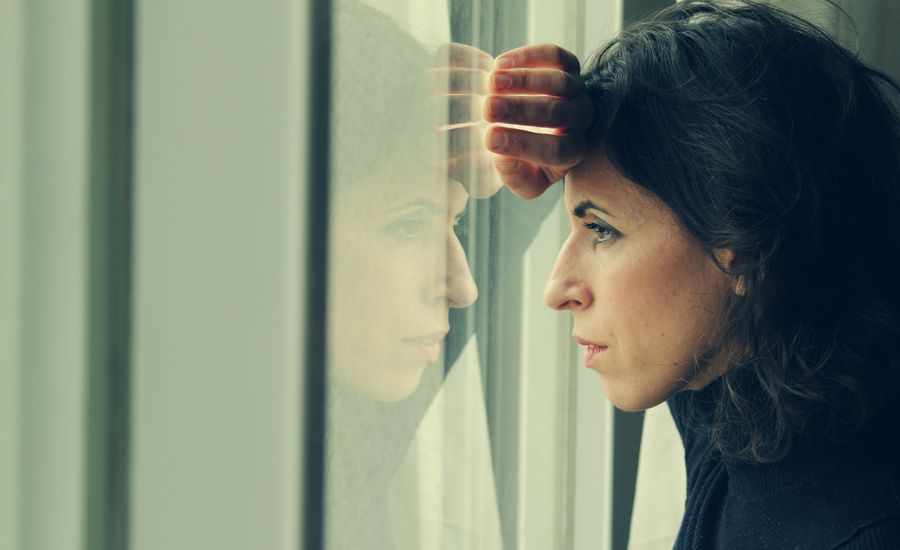When the blues hit, it can be hard to tell whether they’re just a passing cloud or something mental health professionals would diagnose as depression. To sort this out, we talked to Dr. Gail Saltz, an associate professor of psychiatry at The New York Presbyterian Hospital Weill-Cornell School of Medicine, about the signs to look for if you suspect something deeper has struck you or a loved one. A note: These apply to adult men and women; the signs for adolescents are quite different.
There are two varieties of symptoms, says Saltz—the kind that have to do with mood (“neurovegetative”) and the kind relating your body (“biologic”). We run down those and have suggestions for what to do if they appear—from self-care tips to reaching out for professional help.
1. Lousy Feelings That Go On (and On)
“Sadness is normal and does not constitute depression,” says Saltz. Constant feelings of hopelessness, helplessness, worthlessness, and/or non-specific guilt that last for more than two weeks might indicate clinical depression. Of course this excludes crisis or loss. If you’ve just had a loved one die, say, the feelings of loss and deep pain will linger without indicating depression. But even those in mourning can slide into major depression. “If you’re not returning to baseline for a very long time you might need help,” says Saltz.
READ MORE: ELIZABETH SHERRILL ON DEALING WITH DEPRESSION
2. Not Many Ups and Downs
Those lousy feelings will not fluctuate much in non-bipolar depression. “Pure depression is not really known for a lot of mobility of mood,” says Saltz. The most you might see is a slight shift throughout the day, due to a phenomenon called “diurnal variation.” Meaning, you may feel worse in the morning and get a little better as the day goes on—though some people experience the opposite of this.
3. Getting Less Sleep
The most common sleep disturbances in depression are with difficulty falling asleep and waking up earlier than usual, says Saltz. Though in something called “atypical depression,” you may just want to sleep all day long. So note any dramatic shifts in sleep patterns if you’re concerned about depression.
4. Impaired Ability to Function and Relate
Major depression can mess with your ability to concentrate on a task at hand, ultimately interfering with work and relationships, notes Saltz. This inability to be fully on point can also trigger the sufferer to withdraw from people and become socially isolated—which in turn can exacerbate depression.
5. Change in Appetites
Most commonly in depression the sufferer will experience a drop in appetite for food, eating less and maybe losing weight as a result. (Though sometimes the opposite occurs, with the person suddenly eating excessively.) This can extend to other appetites as well—libido often takes a dip during depression. And something called “anhedonia,” the inability to experience pleasure in anything, can also strike. So if the world turns gray, with everything looking, tasting, and seeming blah and unpleasant, this could signal depression.
READ MORE: BIBLE VERSES FOR DEPRESSION
6. Slowing Down
“Feeling physically slowed down and dragging,” can be signs of depression, says Saltz. So if you’ve noticed that you or a loved one seem to be visibly moving more slowly across a room or is uncharacteristically slow to pick things up or react, that can be a sign of something more than simple sadness.
7. An Increase in Anger
Though women tend to seem sad or even irritable during depression, in men especially, the experience can manifest as anger. This can make it harder to diagnose. “That’s why the individual doesn’t realize he’s depressed,” says Saltz, “because it doesn’t look like what we think of as depression.”
8. Suicidal Thoughts
If you’re having thoughts like, “I wish I wouldn’t wake up tomorrow,” or even more actively thinking about a plan to die, get help immediately, says Saltz. Suicide is the 10th leading cause of death in the U.S.—it’s higher for men and even higher in the elderly population.
If you’re concerned that a loved one is considering suicide, ask if they’re considering it and if they have a plan, says Saltz. “If it’s yes to both, it’s urgent,” she says. “You’re not going to suggest something if that’s not what they’re thinking of doing.” If the person tells you they have a plan, get them to a professional immediately.
If you or someone you care about has any of these signs, act. If it’s relatively mild—i.e., there are no suicidal thoughts and you’re still able to function well, you can start with self-care. Try vigorous exercise multiple times a week, get a healthy amount of sleep, don’t over-drink or do drugs, and eat healthfully, suggests Saltz. And do your best to get out and be social—make sure you’re not staying isolated.
But if your abilities to work and relate to others are impaired, get a referral for a good therapist. A psychiatrist can dispense both therapy and medications if needed. A psychologist can offer therapy and refer you for medication. Either way, you’ll get the help you need and know you’re not alone.
For stories of hope and inspiration, subscribe to Guideposts magazine.






